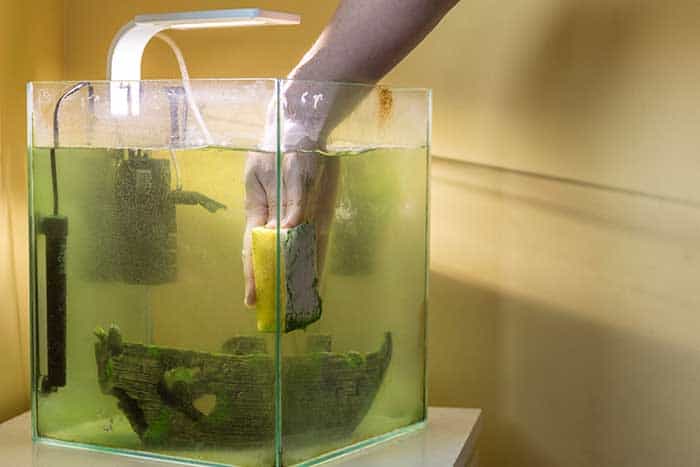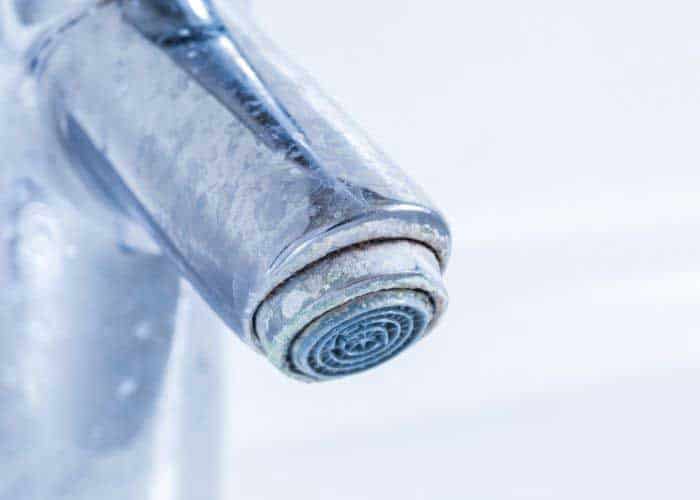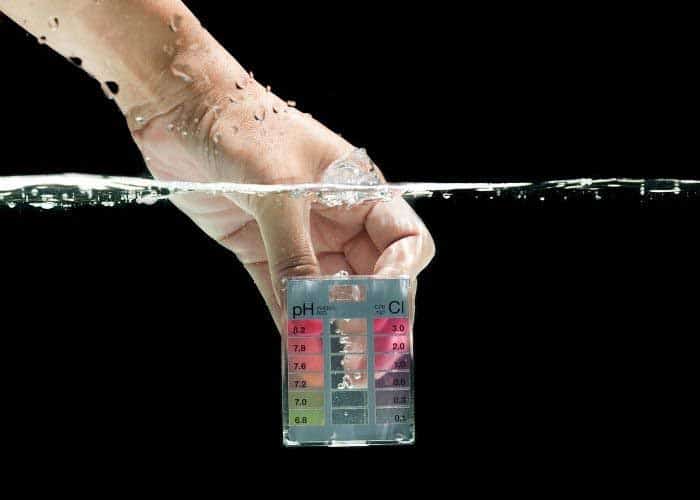How To Remove Water From Fish Tank
Difficult h2o stains are common in fish tanks due to the humidity and constant water evaporation. Evaporated water can get out behind a chalky residuum on the glass surface which can go quite challenging to remove, particularly over time.
You lot will demand to have some basic steps to remove hard water stains from a fish tank, which I will briefly cover below.
- Remove some water from the tank and identify it in a separate holding tank. This is where you will proceed your fish, and past using water from the primary tank, you will avoid shocking the fish.
- Remove your fish carefully with a net and place them into the property tank.
- Remove all water using a gravel siphon or similar for heavily stained glass. If the stains are not too bad, you will not need to remove all of the water. Pocket-sized staining volition require softer cleaning substances that will not harm fish if accidentally mixed with the water.
- Select the advisable cleaning solution and allow it to soak into the stains; then, using a soft toothbrush, algae scraper, or like, you can attempt to loosen the stains. More than hard stains will require yous to repeat these steps.
- Wipe any remaining residue abroad with a dry out cloth or kitchen towel.
- Refill your tank with the h2o you removed, and return your fish to their tank.
The cleaning process higher up may seem quite obvious, but removing hard water stains is not that hard. Some variations are dependent on the blazon of tank you take, the level of staining, and the chemicals you will be using.

'Links on this page that pb to products on Amazon, Chewy, or other retailers are affiliate links and I earn a commission (at no actress cost to you) if you make a purchase. Huge cheers for supporting this site!'
The rest of this commodity volition cover specific cleaning solutions recommended when cleaning hard h2o stains from fish tank glass, and I will besides embrace the methods required for plastic and acrylic tanks.
Finally, I will provide a few actress tips to remove the most difficult stains and how to foreclose calcium buildup in your fish tank.
What Causes Difficult Water Stains In A Fish Tank
Hard water stains in a fish tank are typically caused when mineral-rich water begins to evaporate. The evaporated water leaves the heavier minerals behind, attached to the glass surface, causing a white residue, which is usually a mixture of calcium and magnesium oft chosen limescale.
Over time, equally pure water evaporates, the minerals left behind will become more concentrated, making the stains thicker and more hard to remove. Topping up the water in your tank is all-time washed using a source of pure distilled h2o, every bit this will supervene upon the pure water that has evaporated without calculation actress minerals.
Hard water will usually be present in your fish tank if you lot live in an area with difficult h2o or are using unfiltered h2o from a well or natural spring. You may too notice a white chalky buildup of limescale around your taps or kettle. The best fashion to determine if your h2o is hard is to utilize a test kit.
If you live in a hard water area, information technology is important to employ a water conditioner when adding new water to your tank. This will remove chemicals such as chlorine to brand the water safety for your fish, and it will also help remove many of the minerals present in the h2o.

How To Remove Difficult Water Stains From Glass Fish Tank
If you have hard water stains on your glass fish tank, there are a few ways to remove them. Stains that have been left to build upwardly over time will exist more challenging to remove, whereas lighter, chalky stains will easily wipe away with a soft brush.
You tin can use a soft toothbrush or algae pad for scrubbing the glass. Don't use stiff brushes or scouring pads every bit they can scratch the tank glass, causing permanent damage.
If the stains on your aquarium drinking glass are a chalky, white rest, the methods for cleaning them will be much gentler on your tank and its inhabitants. Generally, I would recommend removing your fish as stated in the steps at the start of this article, nevertheless, light stains may not crave you to remove your fish.
The cleaning solutions that you volition be using practise not contain any harsh chemicals, but they may change the pH of your tank if they enter the water in large amounts. Drastic changes to pH tin can cause illness and shock to fish, and so I would remove iii-v inches of water into a saucepan, giving you room to work. You can return the h2o after cleaning.
First, y'all can effort using vinegar. Mix equal parts vinegar and h2o in a spray canteen and mist the affected areas. Let the solution sit for a few minutes, and then wipe it away with a soft cloth. Using vinegar to clean a fish tank is a great choice but lemon juice is some other alternative. Both are pretty acidic and will help elevator the glass's stains.
Hard water is more often than not quite element of group i with a high KH (Carbonate Hardness) and a stiff buffering capacity confronting acids, then neither should drastically affect your pH in small amounts.
If Vinegar or lemon juice doesn't work, you tin try using a paste made from blistering soda and h2o. Again, utilize the paste to the stains and let information technology sit for a few minutes earlier wiping it away. Baking soda is a great oxidizing agent that will lift stains quite easily.
You tin too scrape off thick limescale deposits, but you will need to exercise caution, or y'all may scratch the glass. A razor blade tin help scrape abroad thicker deposits, all the same, you will need to agree information technology flat against the glass to avert causing any impairment.
Persistent stains may require a commercial hard water stain remover, and you should empty your tank of fish and h2o earlier using these more potent chemicals. These products are available at most hardware stores and can effectively remove stubborn stains. Whatever method you cull, be sure to rinse the tank thoroughly after cleaning to remove any residuum that could harm your fish.
How To Remove Hard Water Stains From Plastic Fish Tank
Plastic fish tanks are more fragile than glass, then you need to take extra care when cleaning them. Non-glass fish tanks are generally made of acrylic, a form of plastic. Acrylic is lighter, cheaper, and easier to repair, only it is also easier to scratch and damage.

Yous tin can also use most of the methods in a higher place to remove hard water stains on acrylic fish tanks, except for a razor blade or excessively harsh chemicals.
Acrylic is much softer than glass, so scraping or rubbing with anything but the softest of brushes or cloths can cause scuffing and scratching to the glass. If y'all choose to employ a razor blade or algae scraper, y'all not only adventure scratching the tank, simply the solid calcium deposits may scratch the tank equally they are removed.
Plastic and acrylic are besides more than porous than drinking glass, so the chalky residual may seep into the pores and become harder to remove. You may need to soak the stains for longer and utilise a fine bristled soft brush to remove these stubborn stains.
Because plastic is besides more than porous than glass, harsh chemicals may burn or distort the plastic or crusade discoloration and misting to the surface. Caustic soda, sulfuric acid, and similar chemicals should be avoided or used at your ain risk.
How To Prevent Calcium Buildup On Fish Tank
Softening your aquarium water, especially if it is excessively hard, will assist to prevent calcium buildup on your fish tank drinking glass, however, calcium and other minerals that are found in hard water can be benign to aquatic life and you lot would not want to remove them birthday.
Earlier softening your aquarium water, you lot should find out its hardness level with a test kit and notice out the level of hardness that is suitable for your fish. If your water is too difficult, you can read this article: How to soften aquarium water (Quick and piece of cake solutions) for some tips.
Considering the chief crusade of scale on your fish tank glass is h2o evaporation, yous should cheque the water level often. You will need to supplant any lost h2o. Replacing water will dilute the minerals, and you will want to add together water with depression mineral content, such as purified, distilled water. I accept already explained that simply h2o evaporates, and minerals volition remain, and then the concentration of minerals volition increase over time.
It would help if you lot also considered using a hood or lid that will allow the water vapor to collect and eventually baste back into the fish tank, reducing evaporation.
Summary
Hopefully, this article has given you insight into why limescale and calcium deposits can build upward on your fish tank drinking glass. Although hard water stains tin can exist found effectually your heater, filter, and don't forget to make clean aquarium decorations, they are most normally found around the waterline. The humid and damp glass contains high levels of these minerals when they dry out out.
Hard h2o stains are not too hard to remove if washed frequently, but over fourth dimension they tin become solid and nigh impossible to shift without some heavy scraping which can damage the glass.
Acidic compounds such every bit vinegar and lemon juice mixed into a spray bottle volition break downwards the scale deposits, making them easier to remove without causing any actual harm to your fish when used in small amounts. Extensive cleaning using commercial chemicals will require you to empty the tank, effectively starting from scratch.
If your hard water stains announced apace and are not acquired by the evaporation procedure, it may hateful your water is excessively hard. There are ways to soften the water, but you lot volition need to mensurate its hardness with a examination kit kickoff.
If you live in an area with very hard water, you will demand to treat the water before using it in your tank, or yous can use distilled water, although water that is too soft and lacking in minerals is too not a skilful solution. Alive plants and fish thrive on the minerals institute in water, so you demand to find a healthy residual.
Frequently Asked Questions
How To Remove Water From Fish Tank,
Source: https://www.fishkeepingacademy.com/how-to-remove-hard-water-stains-from-fish-tank/
Posted by: clearyunifect.blogspot.com


0 Response to "How To Remove Water From Fish Tank"
Post a Comment